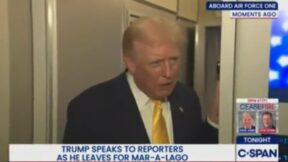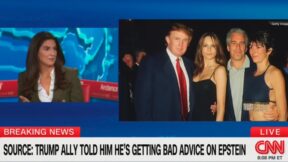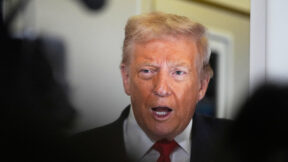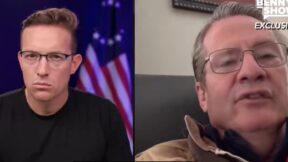Psaki Bristles at Fox News Reporter Over US Response To ‘Atrocities’: We’re ‘Hardly On The Sidelines’
White House Press Secretary Jen Psaki objected when Fox News White House correspondent Jacqui Heinrich wondered aloud about the United States watching atrocities “from the sidelines.”
At a White House press briefing Monday, Heinrich began by asking about wounded Fox News reporter Benjamin Hall and slain American journalist Brent Renaud, which prompted words of support from Psaki.
But things quickly turned contentious when Heinrich pushed for a “red line” on “atrocities” like attacks on civilian targets, and asked just how much the U.S. is willing to “watch from the sidelines.”
Psaki took exception to that characterization:
MS. HEINRICH: But we’ve seen the President been, so far, unwilling to draw a red line on the kinds of atrocities that we’re going to watch from the sidelines. We’ve seen maternity wards being bombed, illegal weapons being used, pediatric hospitals being targeted.
President Obama drew the red line for Syria at chemical weapons. So is there any thought process about what we’re willing to watch happen before there’s —
MS. PSAKI: Well, Jacqui, I think it’s important to reiterate as often as we can that what we’re seeing is horrific, what we’re seeing is barbaric. And the steps that the President has taken and led the world in taking have essentially led the Russian financial system to be on the brink of collapse. We have provided more military assistance to the Ukrainian military and the Ukrainian government than any other country in the world and more historic assistance than any other year to Ukraine in history. And we’re doing that so that we can support them in this difficult moment.
So I would say that, at this moment in time, we have been hardly on the sidelines. We have been leading this effort around the world to respond to every step and every escalatory step that President Putin and the Russians are taking.
MS. HEINRICH: But isn’t there a concern that if we don’t draw the line at something like chemical weapons, that it’ll make it easier for malign actors to use them in the future, because they’ll just go unpunished?
MS. PSAKI: Well, Jacqui, I think that you heard the President say on Friday that there would be severe consequences and the world would respond if they were to use chemical weapons.
And what we have been doing over the course of the last several weeks, if not months, is providing as much information to the global community, to the media, and to others about what to expect.
And when you have President Putin suggesting — and Russian — Russian officials suggesting that the United States and Ukrainians are the ones who are working on a chemical weapons program, it’s clear that this is a pattern that we’ve seen in the past of them trying to set up a predicate for their own actions.
Q But what does — what does that end up looking like if the world responds? Because so far, we’ve heard the President talk a lot about what the U.S. is not going to do, in terms of, you know, not wanting to trigger war with a nuclear power. But do we believe that Putin is, you know, a rational kind of person who, you know, would pay attention to something like that? I mean, he didn’t need provocation to, you know, invade Ukraine. Why wouldn’t we think that he would just create a pretext that is fabricated for something like that?
MS. PSAKI: We do. That’s why we’ve talked about it.
And I think, Jacqui, what’s important here is — and then I’m just going to move on to get to more people — is that for any President, you have to weigh how you can lead the world, how you can make very clear that actions are horrific, that they are not acceptable, they’re not aligned with global norms, while also thinking about our own national security interests. And starting World War Three is certainly not in our national security interests. Putting U.S. troops on the ground in Ukraine to fight a war with Russia is not in our national security interests.
Watch above via NBC News and AP Video.




